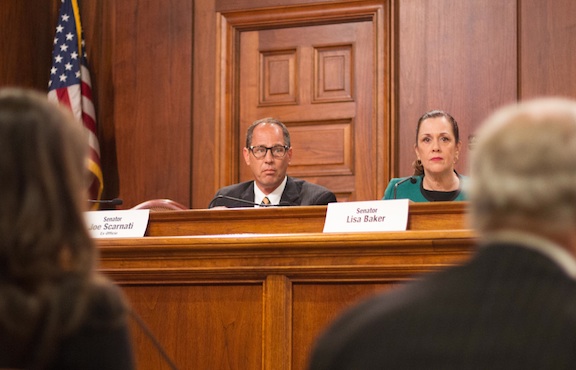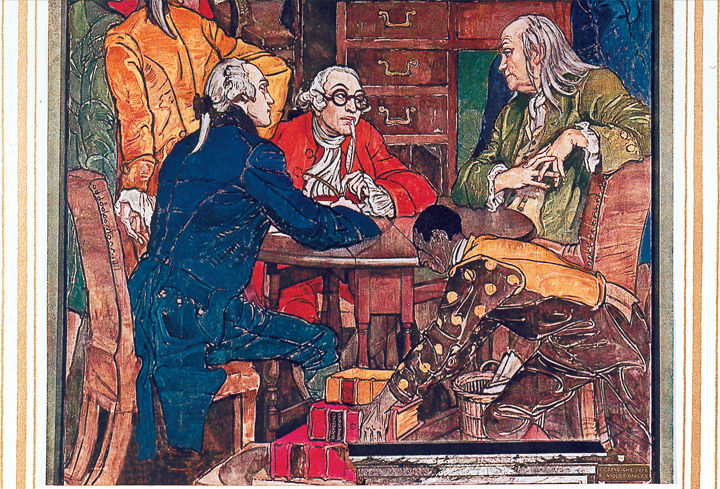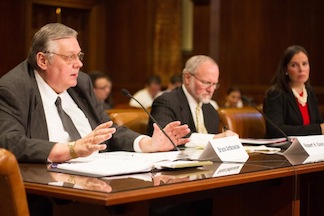Clueless in the Pennsylvania Senate: 1885 case suggests Senate lacks jurisdiction to remove AG Kane

What does ‘reasonable cause’ mean? Don't ask anyone in the Pennsylvania Senate.
But the history of tyranny tells us.
The Pennsylvania state Senate on Tuesday, November 17, conducted an embarrassing hearing that not only demonstrated the weak grasp many senators have of their own state constitution.
Even worse, the hearing demonstrated the senators don’t know where to look to find out what the constitution actually means.
The hearing, conducted by the Senate’s Special Committee on Senate Address, was supposedly convened to explore the Senate GOP leadership’s desire to remove state Attorney General Kathleen Kane from office without the trouble of impeachment proceedings begun in the state House.
AG Kane has questioned the jurisdiction of the Senate to conduct these hearings, and for good reason.
It turns out, she’s right.
The senators have latched on to an obscure clause in the state constitution clearly meant, records show, to remove mentally and physically incapacitated officials from office.
The clause, today found in Article VI Section 7 of the state constitution, reads:
“All civil officers elected by the people, except the Governor, the Lieutenant Governor, members of the General Assembly and judges of the courts of record, shall be removed by the Governor for reasonable cause, after due notice and full hearing, on the address of two-thirds of the Senate.”
What’s the meaning of this clause? Tuesday’s Senate panel was supposed to explain all this.
Unfortunately, the panel, and the Senate committee, failed. And failed badly.
Tuesday’s panel before the Senate committee was comprised of three state attorneys and law professors: Bruce Antkowiak, professor of Saint Vincent College; Robert Davis, Jr., professor of Widener University’s Commonwealth Law School; and Beth Weisser, a partner in the Philadelphia law firm Fox Rothschild.
Panel (l to r) Profs Bruce Antkowiak, Robert Davis, and Beth Weisser. In top photo, Senate President Pro Tempore sits in on committee hearing. |
|
The panel members attempted to deal with both deep, and shallow, constitutional questions lobbed at them by senators on the committee.
But even in the shallow waters, the panel had problems.
The panel waded in with uncertainty on even the shallow-water question of whether Kane, whose law license was suspended, could still serve as attorney general.
Article IV, Section 5 of the constitution reads, “No person shall be eligible to the office of Attorney General except a member of the bar of the Supreme Court of Pennsylvania.”
“I think there’s an argument that could be made,” attorney Weisser told the panel, “that an individual with a suspended law license is still a ‘member of the bar.’ Not an active member. Not a member in good standing. But I think there’s a couple of things that would influence that argument. First there’s a distinction between -- and the rules of disciplinary enforcement make this distinction -- between an attorney who’s been disbarred, and suspended. And the understanding would be that someone’s who’s been disbarred is no longer a member of the bar of the Commonwealth of Pennsylvania. And the rules repeatedly distinguish between someone who’s been disbarred, (and) someone who’s been suspended ....”
So even this relatively simple issue is a controversial one, and is not the slam-dunk that the Senate leaders hoped it would be.
But matters at the Senate committee hearing quickly grew worse.
When the committee and panel waded into still deeper constitutional waters of the Senate’s jurisdiction to remove Kane outside of impeachment, and the framer’s intent behind Article VI, Section 7, and the meaning of the crucial two words, “reasonable cause,” all of which were added to the state constitution in 1874, things quickly fell apart, and became embarrassing.
An argument could be made that an individual with a suspended law license is still a ‘member of the bar’ |
|
Panel members were asked if they knew the meaning of the phrase “reasonable cause” found in Article VI, Section 7.
Amazingly, no one on the panel, or on the Senate Committee, knew the constitutional meaning and intent behind those two historically rich words, “reasonable cause.”
Nor, it turns out, did any of them know much about the history, nor the intent, of Article VI, Section 7, which they improperly hope to invoke against AG Kane.
To understand Article VI, Section 7, its purpose to remove mentally or physically incapacitated office holders, and the meaning of those two words, “reasonable cause,” senators and others interested must read the 1885 removal-from-office case of Allegheny County Judge John M. Kirkpatrick.
In 1885 Judge Kirkpatrick, suffering from severe mental and physical difficulties, was removed from the bench by the state House and Senate, which jointly used the new provisions added to the state’s 1874 constitution a little more than a decade earlier.
Judge Kirkpatrick’s case explains everything.
I suggest members of the Senate committee, the panel, and the public, read the Kirkpatrick case. (I’ve posted it here.)
A close reading of Judge Kirkpatrick’s removal case explains three things important to us, all of which are extremely pertinent to today’s Kane case.
First: what is today’s Article VI, Section 7, was written in tandem at the 1872-73 convention with an almost identically phrased article meant to apply to judges like Kirkpatrick -- Article V, Section 15.
It was this Article V, Section 15 that was used in 1885 by the House and Senate to remove Kirkpatrick from the bench.
Kirkpatrick was a judge, so Article VI, Section 7 wouldn’t apply.
But Article V, Section 15 did.
Even so, these two sections, the Kirkpatrick case explains, must be read together to decipher the clear intent of the framers.
Second: the intent of both of these articles, today handed down to us and causing so much consternation, was clearly and absolutely meant to remove office holders with mental and physical disabilities, not rising to impeachable offenses, and not transgressions involving “law or morals,” as AG Kane’s legal difficulties clearly are.
Third, the Kirkpatrick case clearly explains the meaning and rich history behind those two words, “reasonable cause.”
In 1885, state legislators also stumbled over those two very words.
The phrase ‘reasonable cause’ harkens back to the dark days of tyranny of 17th century English King William III |
|
It turns out that “reasonable cause” has a very specific meaning, having little or nothing at all to do with a law license suspension.
The phrase in question, as it applied in 1885 to Judge Kirkpatrick, found in Article V, Section 15, reads: “for any reasonable cause, which shall not be sufficient grounds for impeachment, the Governor may remove any of them on address of two-thirds of each house of the General Assembly.”
In the Majority Report to the Senate and the House of Representatives, dated March 31, 1885 (pages 131-132) members of the committee to investigate the health of Judge Kirkpatrick explained to their fellow legislators:
“Reasonable cause means something, and as each particular reasonable cause which would be sufficient ground for removal is not enumerated or specified in the Constitution, the light of history alone, shining in upon it, can reveal its true meaning and intent....
“The Legislature clearly cannot remove for trivial or arbitrary causes, and when the Constitution makers framed the article entrusting this power to the Legislature, they doubtless at least presumed that the body would be composed of such wise and intelligent men who would not act without reasonable cause, to be ascertained in such a manner as is usual and customary in legislative bodies.”
The phrase “reasonable cause,” it turns out, harkens back to the dark days of the tyranny of seventeenth century English King William III.
It refers to the history of the British practice of what came to be called “impeachment.”
At one time, any subject of the crown, private or public, and not just a judge or office holder, could be “impeached” by the King or his Parliament.
With time, only office holders could be “impeached.” That was a reform.
Under King William III, the Kirkpatrick case explains, any judge could be removed for any reason, or no reason at all.
“The right to remove judges at pleasure by the sovereigns of England was, at one time, claimed to be a prerogative of the Crown,” the Kirkpatrick papers read.
“It appears that, without any assignable reason, and without notice to the judges even, under the English constitution during the reign of William III, Parliament had the right of removal by concurrence of both Houses.”
“Not until the time of Charles II were judges appointed during good behavior. Neither did this idea become a principle in the English constitution until the year 1701...”
In other words, “reasonable cause” became a liberty. A constitutional protection.
You could no longer simply remove someone without cause, as William III did. You needed to state a cause to do it.
These two words quickly became important boilerplate touchstones of reform in constitutions throughout Europe, and in the young United States.
“The right of removal seems to have been incorporated into several Constitutions in Pennsylvania,” the state legislature was told in 1885, “with the additional limitation, however, that the Governor may remove any of the judges for reasonable cause, on the address of two thirds of each House of the General Assembly.“
So the words “reasonable cause” are constitutional terms-of-art, if you will, meaning that you must have some cause, that you can’t simply act arbitrarily.
It has little or nothing to do with AG Kane’s law license.
‘There can be no doubt that (this) provision was intended to apply to cases where a judge had become incapable of discharging the duties of his office, from either bodily or mental infirmity, arising from any cause. ...If the mind and memory of a judge should become imbecile from old age or other cause (although not amounting to lunacy) and that should be satisfactorily proved, it would be the imperative duty of the Legislature to ask his removal.’ |
|
In fact, to cook up Kane’s law license suspension as a sudden reason to remove her from office is not only arbitrary, it flies in the face of the constitutional protection of a clearly understood “reasonable cause.”
I found it startling that the Senate committee and their panel of experts didn’t know this history.
The 1885 Kirkpatrick case tells us even more.
As the Kirkpatrick case explains, we must read Article V Section 15, and Article VI Section 7 in tandem.
They were meant to do the same thing, for the same reasons: removal of office holders for mental or physical illness.
Article V Section 15 applies to judges.
Article VI Section 7 was meant to apply to office holders who are not judges.
But their intent is identical:
“There can be no doubt,” the legislature was told in the 1885 Kirkpatrick case, “but that the provisions of the Constitution for the removal of judges, on address of two thirds of both House of the Legislature, was intended to apply to cases where a judge had become incapable of discharging the duties of his office, from either bodily or mental infirmity, arising from any cause. If from disease or accident, his physical powers should be so impaired as to render him unable to encounter the labor and fatigue incident to his station.... So, if the mind and memory of a judge should become imbecile from old age or other cause (although not amounting to lunacy) and that should be satisfactorily proved, it would be the imperative duty of the Legislature to ask his removal.”
So Attorney General Kane is correct.
The Senate under Article VI, Section 7 does not have jurisdiction to remove her from office.
That power belongs to the House to impeach her, and the Senate to try her.
I’ll write about the Kirkpatrick case at length in the coming week.
- Bill Keisling
posted November 17, 2015
Bill Keisling is the author of We All Fall Down: A Chronicle of an Impeachment Foretold, an account of the impeachment of Pennsylvania Supreme Court Justice Rolf Larsen.
Related:
Pennsylvania Senate convenes kangaroo court inquiry into Kathleen Kane

